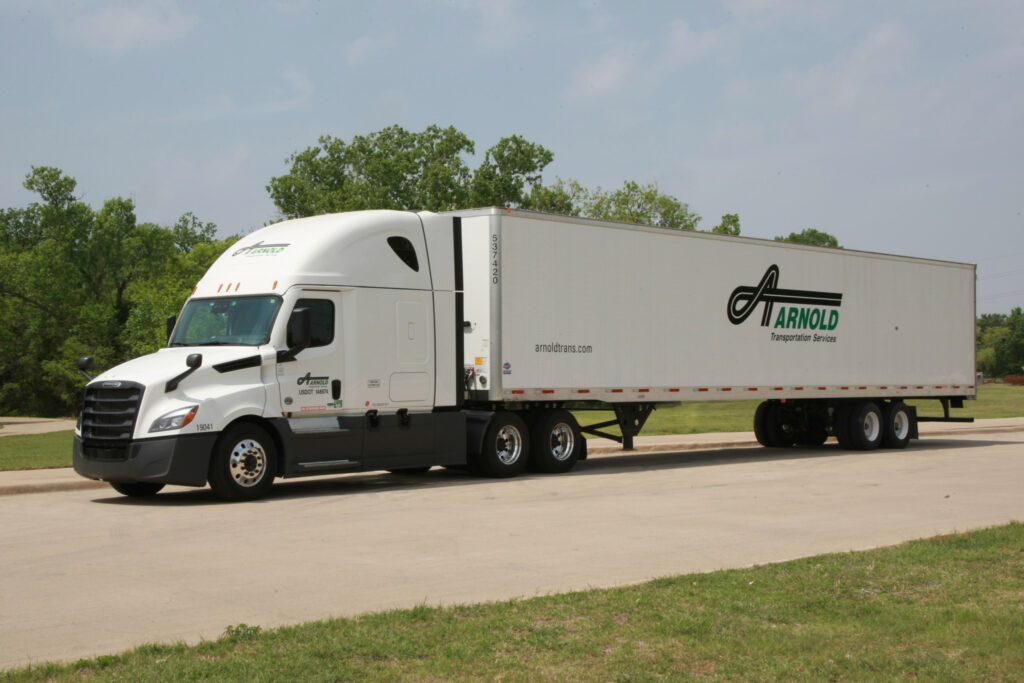Pride Group’s U.S. fleet Arnold Transportation ceases operations
Pride Group’s U.S. fleet Arnold Transportation, which it purchased in 2022, has laid off its employees.
An April 30 Worker Adjustment & Retraining Notification report with the Texas Workforce Commission, indicates there were 157 affected employees. The FMCSA reports Arnold had 402 power units and 341 drivers.

Court filings indicate Arnold Transportation Group was still tightly interwoven with its parent company, Pride Group, which filed for bankruptcy protection in late March. Arnold operated from a property leased from a Pride company and documents indicate Arnold hadn’t been profitable since its 2022 acquisition.
Arnold’s trucks were also leased from a Pride Group business and it was financed with intercompany loans and factoring. Once cut off by factoring company Triumph Factoring Services, its only source of liquidity was intercompany advances or DIP (Debtor-in-Possession) financing; Pride secured a $30 million DIP facility in early April in order to continue its operations.
DIP financings are intended to allow a business in creditor protection to continue operating, while giving the lender priority over a debtor’s assets, if and when they are distributed. “In order to make them eligible to borrow under the DIP Term Sheet, the Syndicate Lenders require ‘know your client’ information be provided,” court documents indicate.
The company was unable to provide that information in time to secure advances under the DIP facility needed to satisfy its financial obligations. It did secure intercompany loans from Pride Truck Sales to the tune of US$800,000 to fund fuel costs and employee wages and benefits.
Attempts were made to sell Arnold Group assets.
“In the event that a sale cannot be consummated in short order, the Arnold Group will have no choice but to cease operations and liquidate,” reads a bankruptcy monitor report dated April 24. “Bankruptcy proceedings are considered to be a last resort for the Arnold Group, but such proceedings may become necessary in the short term if a sale transaction cannot be negotiated.”
Meanwhile, back in Ontario, there are ongoing efforts to sell Pride Group’s real estate, with all properties set to be listed by May 1. Deals for properties in Bolingbrook, Ill., Chehalis, Wash., and Cornwall, Ont., have been reached and are expected to close this month.
Have your say
This is a moderated forum. Comments will no longer be published unless they are accompanied by a first and last name and a verifiable email address. (Today's Trucking will not publish or share the email address.) Profane language and content deemed to be libelous, racist, or threatening in nature will not be published under any circumstances.
-
“Any lessons learned in Brampton?”
Lessons may have been learned, but it’s too late to make corrections. A disproportionate number of Brampton based carriers are solely dependent on Pride Group for their operating necessities like equipment, maintenance, insurance, fuel, financial management, etc., and there is no way Pride Group can prosper, let alone get out of protection, in an economy that cannot begin to recover until this country enjoys a change of government, which, thanks to the NDP (the unelected arbiter of federal power), will not happen before October 2025, making the earliest we will see improved economic numbers Q1 2026.
Unfortunately Pride Group is just the tip of the iceberg. It was just their hapless luck to pull the first short straw. There will be a significant number failures, whether they be logistics, manufacturing, or service industries, between now and 2026.
Everyone, regardless of their industry classification, has depleted their war chests, and are now in survival mode. There are, as we speak, serious conversations and alternative planning going in in boardrooms of a stripes, all across the nation.
If you don’t think I am right, just take note of the increased number of phone calls and emails you are getting every day from people trying to sell you something, anything !!!
Sadly, whether you are an employee, entrepreneur, owner, or shareholder, of any industry, this is just not a good time to be a Canadian.
Fortunately Alberta and Quebec are well positioned to strike out on their own should their respective provincial governments visualize the need to do so. The rest of us … we’re just plain screwed.-
Well run businesses hold their own or even prosper through various governments. (Mullen, for example). Operators need to look in the mirror, not to Ottawa.
-
No one has the wherewithal to outlast an economy trashed by a federal government, not even Mullen.
Just take a look at where the country’s biggest carriers are making their business moves. Mullen is expanding and focusing operations in the west, where provincial governments are at odds with the federal government. TFI is expanding and focusing on the U.S. where they don’t have to deal with the Canadian federal government.
No, to postulate that “well run businesses” are immune to dysfunctional federal governments is pure folly.-
Your hate for Trudeau and the federal Liberal/NDP cabal may be justified but it is clouding your perspective. No trucking business can effect the macro economic environment but no trucking business operates in a vacuum. The same government decisions and policies largely affect us all, for better or worse, leveling the crappy playing field. That said, by providing value and service, making smart decisions, and not chasing freight not worth hauling carriers can sustain a realistic business model and persevere through these tough times. Barking at the moon just gets you a sore throat.
-
-
-
The inexorable ebb and flow of the business cycle continues to claim inexperienced and naive victims. The combination of hubris and poor timing are providing a real cold bucket of reality to unprudent operators like The Pride Group. Unfortunately, there is a sad fallout for employees who depended on them. Fortunately, the job market is robust enough so that most will land on their feet. Any lessons learned in Brampton? Time will tell.